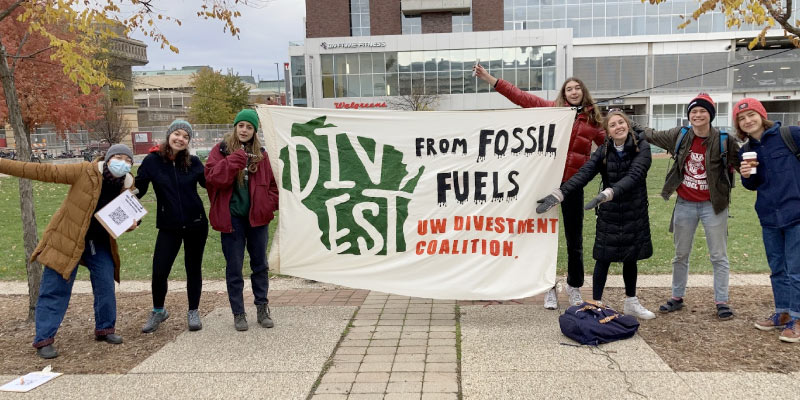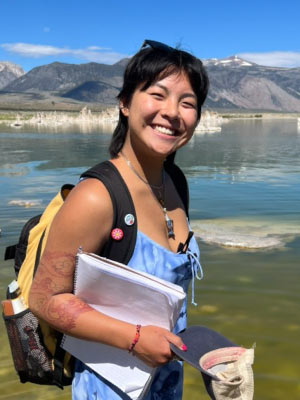
Ashley Cheung’s life has always been intertwined with the environment. Growing up in the Pacific Northwest, Cheung participated in outdoor education programs and went on excursions with her family, where she connected with nature while kayaking, backpacking, and camping in the mountains. “I was very privileged to be able to have so many experiences in nature and a relationship with the environment,” she says. “I really wanted to learn the best ways to continue making the outdoors accessible to people in the future, especially in the midst of climate change.”
Now a senior, Cheung is double-majoring in conservation biology and community and environmental sociology. In particular, she’s taken an interest in food systems, agriculture and mycology (which is the study of mushrooms or fungi), since consuming food is one of the most common ways people interact with the environment on a daily basis. One of her career goals is to manage a small farm, welcoming diverse plants and people. Cheung says, “I want to help strengthen people’s relationships with each other and the land they live on through small-scale agriculture.”
Cheung’s interests and goals make her a perfect fit for the Nelson Institute’s Community Environmental Scholars Program (CESP), which she’s been involved with since the spring semester of her sophomore year. The program requires scholars to take a one-credit seminar course each semester. Cheung’s class met weekly to share food, knowledge, and experiences. “I’ve never had a class like this, where I’m learning so much from my peers.” Cheung reflects. “It helped me practice how to be both a student and a teacher, learning from other students while also running lessons and sharing my perspective.” Cheung highlights the CESP potlucks as one of her favorite parts of being in the program, where she got to try different foods and interact with her fellow scholars.

Another aspect of CESP that Cheung participated in was the service-learning project. Each student in her cohort chose an environmental issue they were interested in and took action to address those issues. Cheung’s focus was on fossil fuel divestment, advocating for UW–Madison to invest in renewable energy sources rather than fossil fuels. To Cheung, this is “a tricky topic because it gets very political and can be hard to explain.” Through this project, Cheung had to learn how to communicate with a wide range of people about the challenges of fossil fuel divestment, but also the benefits that it could provide. From this project, Cheung “learned a lot about understanding different people’s perspectives and communicating across those perspectives.”
At the beginning of last summer, Cheung started working with other students, professors, and researchers on the Grassland 2.0 project. She explains that the goal of the project is to “build a community of farmers that can sharesolutions in grassland and grazing management” — a mission that has caught the attention of donors who wish to preserve Wisconsin’s natural resources. In her role, Cheung works with a project evaluator to interview farmers who are involved with the project in order to identify Grassland 2.0’s strengths and weaknesses. She manages the survey distribution and interviews farmers who want to share their stories. “You have to look at everyone’s individual experiences to understand how a particular project is helping these people and causing change,” she says.
Cheung is also part of the Doris Duke Conservation Scholarship Program (DDCSP), which she was accepted into following the completion of her sophomore year at UW–Madison. The DDCSP aims to foster diversity in the world of conservation. Through this program, Cheung and 19 other students participated in an eight week field course at the University of California, Santa Cruz, where she toured University of California system reserves, interviewed conservationists, worked on field projects, learned how to write research papers, and conducted research. “It was a really unique experience. I got to see conservation in action for myself and participate in it with other people who are also passionate about conservation,” says Cheung.
Cheung’s hobbies while growing up have translated into an excellent educational niche in conservation and the environment. However, being involved with all of these activities — as well as balancing classwork for her double major — leaves Cheung with a lot on her plate. What’s her advice for other students worried about overcommitting? “Don’t rush yourself, and take it easy,” she shared, acknowledging the importance of balancing and prioritizing the numerous opportunities of your undergraduate experience.